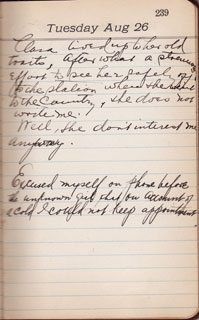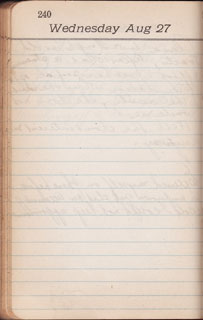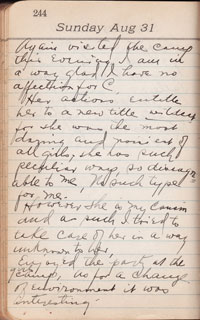
Clara lived up to her old
traits, After what a strenuous
effort to see her safely off
to the station when she went
to the country & she does not
write me.
Well, she don’t interest me
anyway.
Excused myself on phone before
the unknown girl that on account of
a cold I could not keep appointment
—————-
Matt’s Notes
Boy, Clara II really gets under Papa’s skin. To review, Clara II (so nicknamed to distinguish her from Papa’s sister Clara) is a distant cousin on whom Papa’s had a crush for a while. She likes to have him around to flatter and do favors for her, but she obviously doesn’t plan to get romantically involved with him.
For example, as Papa mentions above, the other day she convinced him to help her to the train station as she left for for a Jewish country retreat in Spring Valley, and afterwards he wrote of the “disappointment” and “humiliation” he felt because she’d manipulated him through “trickery.” He received a card from her a couple of days later but insisted he was “indifferent to her.” And today he continues to protest too much: She’s obviously been on his mind enough for him to write an unprompted diary entry about her letter-writing negligence, but he insists she “don’t interest” him.
I wonder if his uncharacteristic use of improper grammar indicates how distracted and angry Clara II makes him, or if he’s trying out some stern-sounding slang for effect, or if he just made a mistake. I also wonder if he called in sick to his blind date because he was really sick or if his irritation with Clara II — which, again, was strong enough to surface in his diary out of the blue — made him too grouchy to deal with an “unknown girl.”
—————-
Additional Note
I added this as an update to my August 16th post, but I’ll mention it a few more times for those keeping score: Clara II might not be Clara Breindel (on of the cousins Papa temporarily shared a bed with when he first came to America) as I’d originally thought. I think she actually might be “Clara the daughter of Cousin Leizer,” a.k.a. “Clara Leizers,” who Papa met shortly after she came over from the old country back in January. Seven months would certainly have given them enough time to establish their patterns of flirtation and frustration, especially considering how quickly and completely Papa could become absorbed with women he found attractive.








